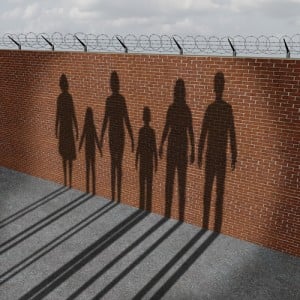ABA ‘deeply disturbed’ by data showing immigrant minors being held past legal time limit

Image from Shutterstock.com.
Responding to reports that the Border Patrol holds immigrant minors for an average of almost twice as long as legally permitted, ABA President Bob Carlson issued a statement Friday calling the situation “unacceptable.”
“The American Bar Association is deeply disturbed by reports that hundreds of unaccompanied children seeking refuge in the United States are being held by the U.S. Border Patrol in violation of the law and federal policies,” Carlson’s statement said. “News reports cite recent federal data that hundreds of children, many aged 12 and younger, have been held in Border Patrol custody for an average of six days, in facilities that are intended to be short-term processing stations.”
The statement came a day after the Washington Post reported, using government data, that initial incarceration at U.S. Customs and Border Protection stations has averaged four days. (The newspaper didn’t say during what time period that average applies.) About half the unaccompanied minors in CBP custody have been there beyond the 72-hour limit required by law, and 250 of unaccompanied children ages 12 or younger have been there an average of six days.
It also came the same day that CNN reported on an unannounced inspection of an El Paso, Texas, Border Patrol station, where the Department of Homeland Security’s inspector general found 750 to 900 people detained in a facility designed for 125. Detainees had limited access to showers and clean clothing and therefore were wearing the same clothes for weeks, the inspector general said. The Office of Inspector General report said CBP employees were worried about their own health and safety.
The Washington Post relied on four government officials speaking on condition of anonymity. Those officials said the DHS cannot process the volume of minors it is receiving. The Washington Post noted that Border Patrol has apprehended nearly 45,000 unaccompanied children since October, according to government data. And authorities had referred 40,800 unaccompanied children to its custody as of the end of April, which marked a 57% increase from the previous year.
The Department of Health and Human Services, which takes custody of unaccompanied minors who haven’t been placed with an adult sponsor, said it has space for them once the DHS finishes its part of the job.
As of mid-May, the HHS said there were 13,200 unaccompanied children in its custody, according to the Washington Post.
 ABA President Bob Carlson. Photo by Mitch Higgins/ABA Media Relations.
ABA President Bob Carlson. Photo by Mitch Higgins/ABA Media Relations.
The Washington Post visited a Border Patrol station in McAllen, Texas this week and found adults with children sleeping head to toe on concrete floors, while others were held in tents in the parking lot outside. A 2015 decision by the federal judge currently handling the long-running Flores case (also known as Flores v. Reno and Flores v. Sessions) take the government to task for providing inadequate food, insufficient access to clean water, bad sleeping conditions and the intentional use of air conditioning to create very cold temperatures—called “hieleras,” or “iceboxes,” by Spanish-speaking immigrants.
The 72-hour limit comes from a 1997 settlement in Flores, a lawsuit over conditions for unaccompanied minors in the immigration system. The case has been reopened multiple times, under presidents of both major parties, when plaintiffs think the government is violating it.
The lead attorney in that lawsuit, Carlos Holguín of the Center for Human Rights & Constitutional Law in Los Angeles, told the Washington Post that the situation is “disturbing.” Amy Cohen, an expert witness in the case and a child psychologist, said children can be traumatized and exposed to communicable diseases if not transferred out of the facilities quickly.
The Trump administration has repeatedly called on Congress to change the law to nullify the Flores settlement to allow it to hold minors and families in detention longer. This past fall, it proposed DHS rules that would change the settlement’s terms unilaterally. The ABA opposed the proposed rules. Final action on this appears to be due in September, according to Regulations.gov.
“The current situation is unacceptable,” Carlson said in his letter. “Leaders at every level of the federal government, including the White House and Congress, must immediately find legal and humane alternatives that relieve the suffering of these children—and then work to create and fund comprehensive, long-term solutions.”



